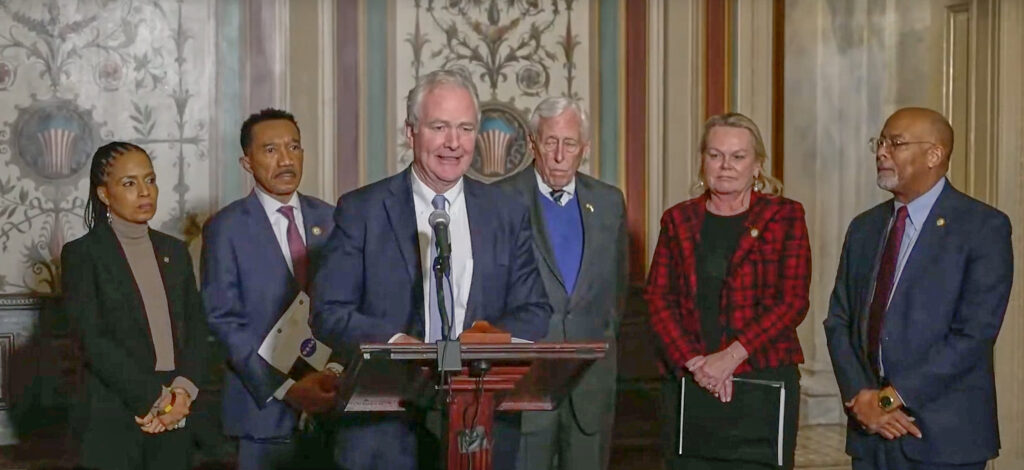Prior to the first meeting of the new council on Monday, November 8, there was a meeting of the previous council in which there was some discussion of whether this last session of the old council should be closed or open – or should include the newly-elected members. The prior councils’ members then present – with Rodney Roberts speaking from the floor in opposition (his 11th hour resignation removed him from the dais) – voted to meet in closed session to discuss matters pertaining, presumably, to Roberts’ resignation and subsequent re-election.
When council regrouped, the frame had shifted forward, with the new council in place, though the video does not record the first several minutes of the meeting. Mayor Emmett Jordan took the chair with new Mayor Pro Tem Kristen Weaver to his left. Councilmembers were sworn in and seated so that the lowest vote-getters occupied the seats farthest from center. Jordan invited councilmembers to speak.
The video recording begins with over 15 minutes of a speech by former Mayor Colin Byrd, speaking from a seat on the far right of the podium. He suggested that his slide from highest to second lowest in the vote was the consequence of taking on tough issues and “ruffling feathers.” He opined that against the backdrop of social change and the disruptions of the pandemic, there was an appetite for the “good old days” and for silence on “thorny issues.” He ascribed his reduced vote as a wish by some voters to downplay or dilute issues in the cause of preventing divisiveness. He reminded Greenbelters not to be so concerned with “preserving the mythology of a Utopia that always has been incomplete,” stating that there is a need to move to a more perfect union. He also asked that Greenbelters not conflate lifting up marginalized communities with somehow being a threat to those closest to power and those with amenities. He quoted Dr. Martin Luther King, saying, “One must take a position that is not safe, nor politic, nor popular but one must take it because conscience tells him it is right.”
He pointed out that Greenbelt hadn’t elected a Black councilmember until 2009 even though many other local jurisdictions had done so much earlier, and said how encouraged he was to see three members of color now on council. He was pleased that the city, as a result of the voting, was a big step closer to reparations.
After stating that the Greenbelt police force has dozens of fine police officers, he said that Greenbelt has had a reputation among some African Americans in this city and county that there are a handful of individuals (presumably in the police force) whose obvious friendliness to some in the city sharply contrasted with suspicion or aggression toward others, noting that “we are on the verge of passing police reform.”
Finally, he acknowledged that in his tenure as mayor, he had sometimes let his frustrations and passions overcome him and felt he could have done a better job of bridging divides. He apologized for some of his actions and statements that were made out of passion.
In a lengthy analogy, the former mayor emphasized how much stronger a forest was if the trees in it were diverse in age – presumably referring to the younger average age of council since the election. He then thanked the people of Greenbelt, even those who opposed him, in his continuing tree metaphor, for shining the light he needed to grow and for the pruning that helps him to grow.
Three other councilmembers took the opportunity to speak, each confining themselves to a short statement.
Ric Gordon thanked Greenbelt for allowing him to serve. He pledged all of himself to the service of council, saying he would be constantly “thinking of you and how to serve you better.” He hoped that residents would come together and grow together as one city. He exhorted the members of council to come together collectively for the benefit of all in the city.
Silke Pope also thanked voters for the opportunity to represent them and to many friends for their support as she ran for council, saying that nobody wins an election alone. She wanted everyone to feel welcome in this diverse community and noted that though everyone may not always agree, by working together they can achieve their goals. She hoped that council could come together and bring civility and respect back to the meetings.
Judith Davis expressed herself grateful for re-election to her 15th term on council. She thanked her committee, city staff and all the candidates who presented ideas and viewpoints on how to make Greenbelt even better. She too praised the new council’s diversity in geography, race and gender. She thanked retired councilmembers Edward Putens and Leta Mach for their long service.
Davis felt that the “new normal” will be formed by everybody in Greenbelt, including council, and that “we must use our resources wisely even as we celebrate and look forward.”
Vote Protest
In a jarring departure from the measured calm of the proceedings, William Orleans, a perennially unsuccessful candidate for council and frequent speaker at council meetings, complained of inequitable voting opportunity, peculiar mail-in process, poor understanding with the U.S. Postal Service and that the machines provided didn’t confirm the count at the start or at the conclusion of the election. Orleans persisted in speaking despite attempts to keep him to a three-minute limit, multiple assurances that he would be heard at the appropriate time and place, and despite multiple requests from Jordan to desist. In fact, Orleans only stopped when overtaken by a hasty motion to adjourn.



